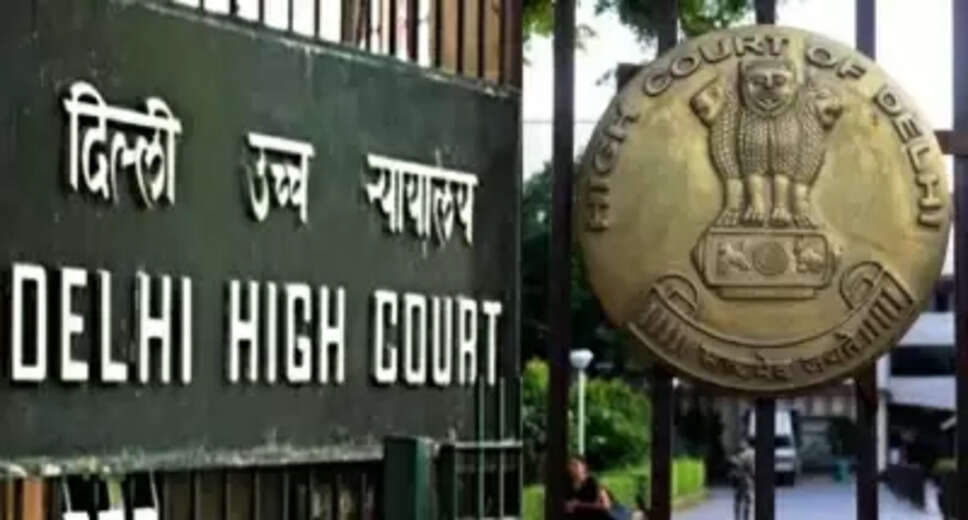Delhi HC asks Centre to take policy decision on filling up vacant MBBS seats for PWD candidates
The Delhi High Court on Tuesday asked the Centre to take a policy decision on filling up vacant seats, reserved for persons with disabilities (PwD), in medical colleges by taking in candidates who have lesser degree of disability than the prescribed benchmark.
Feb 22, 2023, 18:34 IST

New Delhi, Feb 22- The Delhi High Court on Tuesday asked the Centre to take a policy decision on filling up vacant seats, reserved for persons with disabilities (PwD), in medical colleges by taking in candidates who have lesser degree of disability than the prescribed benchmark.
A division bench headed by Chief Justice Satish Chandra Sharma also asked the Centre to respond, within three weeks, to a petition filed by an MBBS aspirant, who suffered from a locomotor disability and sought admission in a medical college against an unfilled seat reserved for persons with disabilities.
The bench listed the case for the next hearing on April 13.
The MBBS aspirant had appeared in the National Eligibility-cum-Entrance Test (NEET) 2022 for undergraduate admission to medical colleges and scored 96.06 percentile and attained the 42nd Rank under the Unreserved Persons with Disabilities (UR-PwD) Category.
However, she was found to be short of the 40 per cent threshold prescribed as benchmark under Section 2(r) of the Rights of Persons with Disabilities (RPwD) Act, 2016, for availing the PwD seat.
The petitioner, whom the AIIMS medical board only considered the deformity in her middle, ring fingers and metacarpals and left out the index finger and disability to be 30 per cent, urged that she be allocated one of the vacant seats under the PwD category in the ongoing NEET-UG 2022 cycle.
Lawyer Rahul Bajaj, representing the petitioner, said that a representation was submitted by the petitioner to the Centre government in which it was urged to allocate seats reserved for PwD category to the aspirant who may have a less percentage of disability than what has been prescribed as the benchmark.
Terming a genuine concerned raised by the petitioner, the court ordered the Central government to take a policy decision in the matter and the reply shall include the decision on the representation.
Appreciating the efforts of Bajaj, who is visually challenged, the court also asked its registry to provide documents to the lawyer in a format accessible to him.
A division bench headed by Chief Justice Satish Chandra Sharma also asked the Centre to respond, within three weeks, to a petition filed by an MBBS aspirant, who suffered from a locomotor disability and sought admission in a medical college against an unfilled seat reserved for persons with disabilities.
The bench listed the case for the next hearing on April 13.
The MBBS aspirant had appeared in the National Eligibility-cum-Entrance Test (NEET) 2022 for undergraduate admission to medical colleges and scored 96.06 percentile and attained the 42nd Rank under the Unreserved Persons with Disabilities (UR-PwD) Category.
However, she was found to be short of the 40 per cent threshold prescribed as benchmark under Section 2(r) of the Rights of Persons with Disabilities (RPwD) Act, 2016, for availing the PwD seat.
The petitioner, whom the AIIMS medical board only considered the deformity in her middle, ring fingers and metacarpals and left out the index finger and disability to be 30 per cent, urged that she be allocated one of the vacant seats under the PwD category in the ongoing NEET-UG 2022 cycle.
Lawyer Rahul Bajaj, representing the petitioner, said that a representation was submitted by the petitioner to the Centre government in which it was urged to allocate seats reserved for PwD category to the aspirant who may have a less percentage of disability than what has been prescribed as the benchmark.
Terming a genuine concerned raised by the petitioner, the court ordered the Central government to take a policy decision in the matter and the reply shall include the decision on the representation.
Appreciating the efforts of Bajaj, who is visually challenged, the court also asked its registry to provide documents to the lawyer in a format accessible to him.
